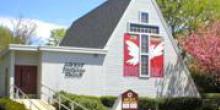OUR GOD IS ACTIVE!
Join in prayer daily with the Transition Team and Pr. Angela Shan non: “O God, You have called Your servants to ventures of which we cannot see the ending, by paths as yet untrodden, through perils unknown. Give us faith to go out with good courage, not knowing where we go, but only that Your hand is leading us and Your love supporting us; through Jesus Christ our Lord. Amen.”
From Your Transition Team: A Congregational Assessment
Your participation in the congregational assessment currently underway is vital to helping leadership plan for Advent’s future ministries.
Thank You, Eileen & Ron Breuer for hosting the July 10th Agape!
What a great evening of Communion, prayer, food and fellowship! One Sunday coming up we’ll ask everyone in the “Agape Choir” to come forward to sing, “Peter & James & John in Sailboat.”
Peconic Conference Young Adults
Peconic Conference congregations are planning a Brunch for young adults in their twenties on Saturday, August 17th. If any are interested in attending, please let me know at crvogeley@gmail.com so I can let Pastors Claire Repsholdt (Our Savior, Patchogue) and Elsa Marty (Trinity, Rocky Point) know you want to be included on the invitation list.
For Your Listening Pleasure & Edification
https://www.youtube.com/watch?v=4ILA-BSuO5w

